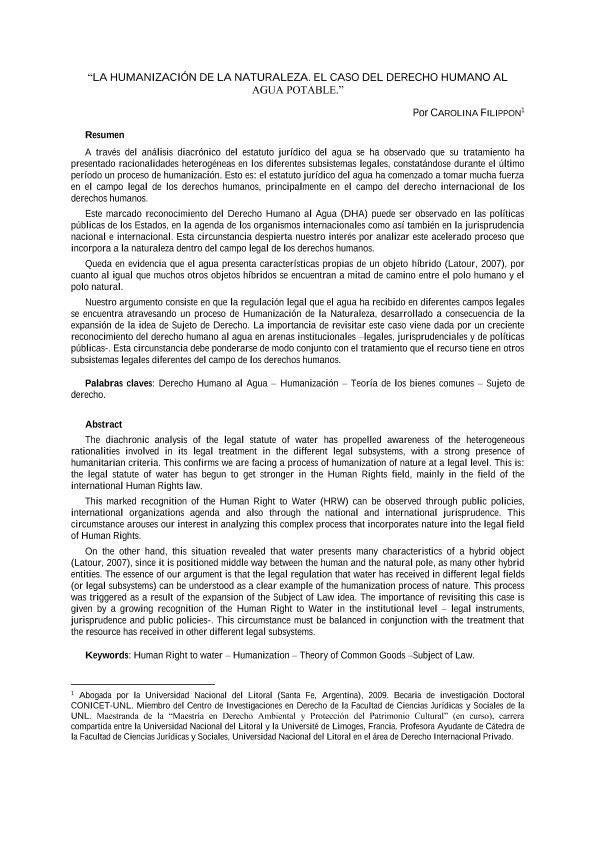Artículo
A través del análisis diacrónico del estatuto jurídico del agua se ha observado que su tratamiento ha presentado racionalidades heterogéneas en los diferentes subsistemas legales, constatándose durante el último período un proceso de humanización. Esto es: el estatuto jurídico del agua ha comenzado a tomar mucha fuerza en el campo legal de los derechos humanos, principalmente en el campo del derecho internacional de los derechos humanos. Este marcado reconocimiento del Derecho Humano al Agua (DHA) puede ser observado en las políticas públicas de los Estados, en la agenda de los organismos internacionales como así también en la jurisprudencia nacional e internacional. Esta circunstancia despierta nuestro interés por analizar este acelerado proceso que incorpora a la naturaleza dentro del campo legal de los derechos humanos. Queda en evidencia que el agua presenta características propias de un objeto híbrido (Latour, 2007), por cuanto al igual que muchos otros objetos híbridos se encuentran a mitad de camino entre el polo humano y el polo natural. Nuestro argumento consiste en que la regulación legal que el agua ha recibido en diferentes campos legales se encuentra atravesando un proceso de Humanización de la Naturaleza, desarrollado a consecuencia de la expansión de la idea de Sujeto de Derecho. La importancia de revisitar este caso viene dada por un creciente reconocimiento del derecho humano al agua en arenas institucionales legales, jurisprudenciales y de políticas públicas-. Esta circunstancia debe ponderarse de modo conjunto con el tratamiento que el recurso tiene en otros subsistemas legales diferentes del campo de los derechos humanos. The diachronic analysis of the legal statute of water has propelled awareness of the heterogeneous rationalities involved in its legal treatment in the different legal subsystems, with a strong presence of humanitarian criteria. This confirms we are facing a process of humanization of nature at a legal level. This is: the legal statute of water has begun to get stronger in the Human Rights field, mainly in the field of the international Human Rights law. This marked recognition of the Human Right to Water (HRW) can be observed through public policies, international organizations agenda and also through the national and international jurisprudence. This circumstance arouses our interest in analyzing this complex process that incorporates nature into the legal field of Human Rights. On the other hand, this situation revealed that water presents many characteristics of a hybrid object (Latour, 2007), since it is positioned middle way between the human and the natural pole, as many other hybrid entities. The essence of our argument is that the legal regulation that water has received in different legal fields (or legal subsystems) can be understood as a clear example of the humanization process of nature. This process was triggered as a result of the expansion of the Subject of Law idea. The importance of revisiting this case is given by a growing recognition of the Human Right to Water in the institutional level – legal instruments, jurisprudence and public policies-. This circumstance must be balanced in conjunction with the treatment that the resource has received in other different legal subsystems.
La Humanización de la Naturaleza: El caso del derecho humano al agua potable
Fecha de publicación:
09/2016
Editorial:
Abeledo Perrot
Revista:
Revista Jurídica de Buenos Aires
ISSN:
2451-5795
Idioma:
Español
Tipo de recurso:
Artículo publicado
Clasificación temática:
Resumen
Archivos asociados
Licencia
Identificadores
Colecciones
Articulos(CCT - SANTA FE)
Articulos de CTRO.CIENTIFICO TECNOL.CONICET - SANTA FE
Articulos de CTRO.CIENTIFICO TECNOL.CONICET - SANTA FE
Citación
Filippon, Carolina; La Humanización de la Naturaleza: El caso del derecho humano al agua potable; Abeledo Perrot; Revista Jurídica de Buenos Aires; 2016; 1; 9-2016; 3-38
Compartir




